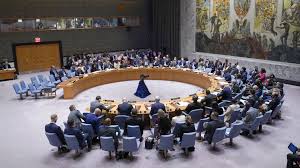UNSC Reform:

With the United Nations (UN) approaching its 80th anniversary next year, the Group of Four (G4) countries seeking permanent membership and reform of the UN Security Council (UNSC) called for urgent reform of the world body. Other plurilateral groupings, such as the L69 and C-10 also echoed these calls.
- The Group of Four (G4) countries—India, Brazil, Germany, and Japan—are seeking urgent reform of the UN Security Council (UNSC) to include both permanent and non-permanent members from developing countries.
- G4 and other groups such as L69 and C-10 emphasized the need for reform to make the UNSC more representative, democratic, and transparent, especially for Global South representation.
- The UNSC reform is critical to enhancing its credibility and legitimacy, with these groups pressing for immediate text-based negotiations.
- L69 Grouping: 32 developing nations including India, from Asia, Africa, Latin America, the Caribbean, and Pacific Small Island Developing States.
- Aim: Expansion of UNSC permanent and non-permanent categories to reflect contemporary global realities and promote a more accountable and transparent Security Council.
- C10 Grouping: Committee of Ten Heads of State and Government of the African Union (C10), comprising 10 African nations.
- Aim: Focuses on UNSC reform, advocating for better representation of Africa and pushing the Common African Position based on the Ezulwini Consensus and Sirte Declaration.
United Nations Security Council (UNSC):
- Origin: Established in 1945 after World War II as one of the five principal organs of the United Nations.
- Led by 15 Members—5 permanent (P5: UK, USA, Russia, China, France) and 10 non-permanent members elected for two-year terms.
- HQ: United Nations Headquarters, New York City.




